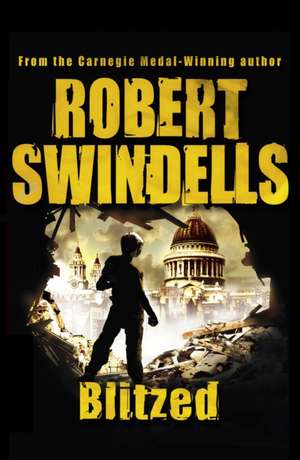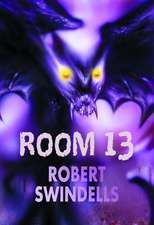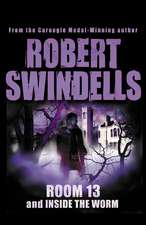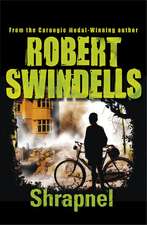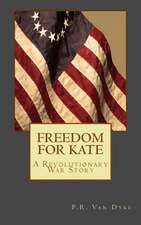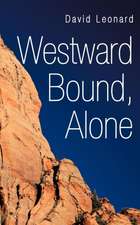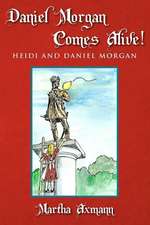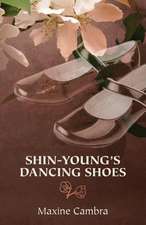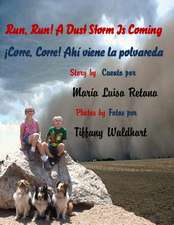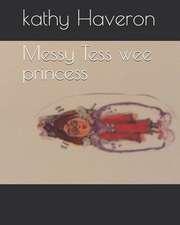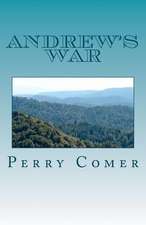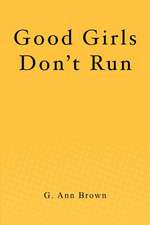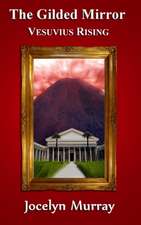Blitzed
Autor Robert Swindellsen Limba Engleză Paperback – 31 dec 2006 – vârsta de la 12 ani
George is fascinated by World War II; bombers, Nazis, doodlebugs. But he discovers the reality is very different from how he had imagined it when a school trip to the war museum leads to a timeslip -- and George is in London at the time of the Blitz.
Preț: 41.56 lei
Preț vechi: 50.18 lei
-17% Nou
Puncte Express: 62
Preț estimativ în valută:
7.95€ • 8.30$ • 6.58£
7.95€ • 8.30$ • 6.58£
Carte disponibilă
Livrare economică 14-26 martie
Livrare express 27 februarie-05 martie pentru 23.64 lei
Preluare comenzi: 021 569.72.76
Specificații
ISBN-13: 9780552555890
ISBN-10: 0552555894
Pagini: 173
Dimensiuni: 133 x 197 x 11 mm
Greutate: 0.12 kg
Editura: Corgi Books
Locul publicării:United Kingdom
ISBN-10: 0552555894
Pagini: 173
Dimensiuni: 133 x 197 x 11 mm
Greutate: 0.12 kg
Editura: Corgi Books
Locul publicării:United Kingdom
Notă biografică
Robert Swindells left school at fifteen to work on a local newspaper. At seventeen, he joined the RAF for three years, then trained and worked as a teacher. Now a full-time writer, he is the author of a number of bestselling titles. In 1994 he won the Carnegie Medal for Stone Cold, a teenage novel about a serial killer.
Extras
One
'Dad, what if the Queen trumped on telly?'
'George!' goes Mum, before Dad has a chance to answer. Emily gets the giggles. She's seven, thinks trump's the ultimate swearword. The six o'clock news is on. State opening of Parliament. I only ask 'cause I'm bored. Anything's better than boredom, even getting shouted at, but Dad doesn't shout. Knows me too well, I suppose. Instead he's like, 'Never happen, old lad, they're trained to avoid stuff like that: starts when they're two.' Comes out with it deadpan, like it's common knowledge, eyes never leave the screen.
'Oh,' I reply. Well, what else can I say? Emily's still giggling. She's got her hands over her face so Mum can't zap her with a frown. I get up. 'Off to my room.' Nobody begs me to stay.
Best bit of the house, my room. Done out in a World War Two theme. Mum's forever moaning about my models. Dust traps, she calls them. Military vehicles is what they actually are. I've got fourteen so far, built 'em all myself. From kits. Tanks, scout cars, trucks. I've got seventeen planes as well, hanging from the ceiling; all World War Two. I don't collect any other sort.
I lie on my bed and look up at the planes. The Stuka's my favourite, it's a dive-bomber. Was, I mean, in the war. I've hung it so it looks as if it's diving straight at me. It's really ugly, like an iron vulture. I think that's why I like it.
I can't wait till tomorrow. We're off up to Yorkshire, to this World War Two museum. Eden Camp. It's called that because it used to be a prisoner-of-war camp, and I know what you're thinking. You're thinking, Yawn yawn, flipping museum, but it's not that sort of museum. Dad got a brochure and it looks cool. Really cool. Anyway I don't give a toss what you think -- it's not you who's going, is it?
Two
Seven o'clock. Breakfast. I look at Dad. 'What time we setting off, Dad?'
He eyeballs me over his coffee mug. 'You're lucky to be setting off at all, lad, that crack about the Queen.'
'What? It wasn't a crack, it was a question.'
'Same thing, question like that.'
'Trump,' murmurs Emily.
'And that'll do from you as well, young woman.'
We get off at half eight. One hour drive. Mum up front, me and Em in the back. Brilliant weather, loads of traffic. 'Hope they're not all going where we're going,' says Mum.
Dad shakes his head. 'East coast, most of 'em. Scarborough, Brid. Not many people go to museums.'
'They're trained to avoid stuff like that,' I can't resist saying. 'Starts when they're two.' He looks at me in the mirror but I'm deadpan, gazing out the window. He doesn't say anything.
Eden Camp's even acer than I expected. First thing I see is this Hurricane: real one, parked in the open. Tank, too. And then the huts: rows of 'em, each one dedicated to a different aspect of World War Two. We're two and a half hours going through them all. One's all about evacuation: thousands of kids with labels on like parcels, getting on trains to go and live in the countryside where they won't be bombed. 'How would you fancy that, you two?' goes Mum. 'Say goodbye to me and your dad, go off to live in some stranger's house with no idea how long it's going to last?'
Em shakes her head and slips her hand through Mum's arm, but I grin. 'It'd be great: somewhere different, new stuff to do, no school.'
'They'd to go to school, dummy,' goes Dad. 'Strange schools too, full of kids they didn't know and teachers who didn't want 'em there, probably. And no mum to run home to if you didn't like it.'
'I wouldn't care: at least I wouldn't be bored all the time like I am now.'
He has no answer to that. We move on.
One hut has a doodlebug outside it, mounted on a plinth. The doodlebug was this flying bomb with a jet engine and a ton of high explosive in its nose. The Germans invented it; they were cleverer than us in the war. 'It's real name was the V-1,' I say to Emily. She's fed up and doesn't give a hoot ifits real name was Z-50,000, but I've read all about the V-1 and want to show off. 'It flew at five hundred miles an hour and could wipe out a whole street of houses. The way it worked was-'
'I don't think your sister's particularly interested in flying bombs, Georgie,' goes Mum, taking Em's hand. 'Come on, sweetheart, I know where there's some lovely ice-cream.'
Ice-cream? What's ice-cream got to do with World War Two, that's what I'd like to know.
We all have some, then we come to the best hut of all: the Blitz hut. It's absolutely unbelievable: dark and smoky with the drone of enemy bombers overhead, bombs whistling down, bangs and flashes of anti-aircraft guns and a pulsating glow from burning buildings. It's not real, of course, but they've made a fantastic job of faking it. Right at the far end is this bombed-out house: drifts of smashed bricks and rubble with bits of furniture and stuff sticking out and water spurting from a fractured pipe. It's like you're there, in London, in the autumn of 1940.
There's a barrier. I lean on it for ages, watching and listening. And wishing. The others have moved on and I don't notice till Dad comes back and taps me on the shoulder, making me jump. 'Come on, Georgie, we wondered where on earth you'd got to.'
I follow him out, my ears ringing. 'Dad, I wish . . .'
'What?'
'I wish I'd been there. Seen it all. It must've been dead exciting.'
He shakes his head. 'Awful, old lad. People blown to bits, cut to ribbons by flying glass. Imagine Emily buried under tons of rubble, all by herself, choking. They don't show the full horror.'
Mum catches the tail-end of this and says, 'Ask Miss Coverley at number twenty-two, Georgie: she was in London, she'll tell you.'
Which just goes to show how much mums know. Miss Coverley doesn't like me and I don't like her. I wouldn't ask her for a bucket of water if I was on fire, the miserable old bag. I can't be bothered now 'cause I'm knackered, but I'll tell you all about Miss Coverley tomorrow.
Something for you to look forward to.
'Dad, what if the Queen trumped on telly?'
'George!' goes Mum, before Dad has a chance to answer. Emily gets the giggles. She's seven, thinks trump's the ultimate swearword. The six o'clock news is on. State opening of Parliament. I only ask 'cause I'm bored. Anything's better than boredom, even getting shouted at, but Dad doesn't shout. Knows me too well, I suppose. Instead he's like, 'Never happen, old lad, they're trained to avoid stuff like that: starts when they're two.' Comes out with it deadpan, like it's common knowledge, eyes never leave the screen.
'Oh,' I reply. Well, what else can I say? Emily's still giggling. She's got her hands over her face so Mum can't zap her with a frown. I get up. 'Off to my room.' Nobody begs me to stay.
Best bit of the house, my room. Done out in a World War Two theme. Mum's forever moaning about my models. Dust traps, she calls them. Military vehicles is what they actually are. I've got fourteen so far, built 'em all myself. From kits. Tanks, scout cars, trucks. I've got seventeen planes as well, hanging from the ceiling; all World War Two. I don't collect any other sort.
I lie on my bed and look up at the planes. The Stuka's my favourite, it's a dive-bomber. Was, I mean, in the war. I've hung it so it looks as if it's diving straight at me. It's really ugly, like an iron vulture. I think that's why I like it.
I can't wait till tomorrow. We're off up to Yorkshire, to this World War Two museum. Eden Camp. It's called that because it used to be a prisoner-of-war camp, and I know what you're thinking. You're thinking, Yawn yawn, flipping museum, but it's not that sort of museum. Dad got a brochure and it looks cool. Really cool. Anyway I don't give a toss what you think -- it's not you who's going, is it?
Two
Seven o'clock. Breakfast. I look at Dad. 'What time we setting off, Dad?'
He eyeballs me over his coffee mug. 'You're lucky to be setting off at all, lad, that crack about the Queen.'
'What? It wasn't a crack, it was a question.'
'Same thing, question like that.'
'Trump,' murmurs Emily.
'And that'll do from you as well, young woman.'
We get off at half eight. One hour drive. Mum up front, me and Em in the back. Brilliant weather, loads of traffic. 'Hope they're not all going where we're going,' says Mum.
Dad shakes his head. 'East coast, most of 'em. Scarborough, Brid. Not many people go to museums.'
'They're trained to avoid stuff like that,' I can't resist saying. 'Starts when they're two.' He looks at me in the mirror but I'm deadpan, gazing out the window. He doesn't say anything.
Eden Camp's even acer than I expected. First thing I see is this Hurricane: real one, parked in the open. Tank, too. And then the huts: rows of 'em, each one dedicated to a different aspect of World War Two. We're two and a half hours going through them all. One's all about evacuation: thousands of kids with labels on like parcels, getting on trains to go and live in the countryside where they won't be bombed. 'How would you fancy that, you two?' goes Mum. 'Say goodbye to me and your dad, go off to live in some stranger's house with no idea how long it's going to last?'
Em shakes her head and slips her hand through Mum's arm, but I grin. 'It'd be great: somewhere different, new stuff to do, no school.'
'They'd to go to school, dummy,' goes Dad. 'Strange schools too, full of kids they didn't know and teachers who didn't want 'em there, probably. And no mum to run home to if you didn't like it.'
'I wouldn't care: at least I wouldn't be bored all the time like I am now.'
He has no answer to that. We move on.
One hut has a doodlebug outside it, mounted on a plinth. The doodlebug was this flying bomb with a jet engine and a ton of high explosive in its nose. The Germans invented it; they were cleverer than us in the war. 'It's real name was the V-1,' I say to Emily. She's fed up and doesn't give a hoot ifits real name was Z-50,000, but I've read all about the V-1 and want to show off. 'It flew at five hundred miles an hour and could wipe out a whole street of houses. The way it worked was-'
'I don't think your sister's particularly interested in flying bombs, Georgie,' goes Mum, taking Em's hand. 'Come on, sweetheart, I know where there's some lovely ice-cream.'
Ice-cream? What's ice-cream got to do with World War Two, that's what I'd like to know.
We all have some, then we come to the best hut of all: the Blitz hut. It's absolutely unbelievable: dark and smoky with the drone of enemy bombers overhead, bombs whistling down, bangs and flashes of anti-aircraft guns and a pulsating glow from burning buildings. It's not real, of course, but they've made a fantastic job of faking it. Right at the far end is this bombed-out house: drifts of smashed bricks and rubble with bits of furniture and stuff sticking out and water spurting from a fractured pipe. It's like you're there, in London, in the autumn of 1940.
There's a barrier. I lean on it for ages, watching and listening. And wishing. The others have moved on and I don't notice till Dad comes back and taps me on the shoulder, making me jump. 'Come on, Georgie, we wondered where on earth you'd got to.'
I follow him out, my ears ringing. 'Dad, I wish . . .'
'What?'
'I wish I'd been there. Seen it all. It must've been dead exciting.'
He shakes his head. 'Awful, old lad. People blown to bits, cut to ribbons by flying glass. Imagine Emily buried under tons of rubble, all by herself, choking. They don't show the full horror.'
Mum catches the tail-end of this and says, 'Ask Miss Coverley at number twenty-two, Georgie: she was in London, she'll tell you.'
Which just goes to show how much mums know. Miss Coverley doesn't like me and I don't like her. I wouldn't ask her for a bucket of water if I was on fire, the miserable old bag. I can't be bothered now 'cause I'm knackered, but I'll tell you all about Miss Coverley tomorrow.
Something for you to look forward to.
Recenzii
"Grips the reader from the opening paragraph" The Sunday Times "Robert Swindells writes the kind of books that are so scary you're afraid to turn the page" Young Telegraph "Classic war fiction which will stick in you mind forever" -- Ben Howie Newcastle Upon Tyne Evening Chronicle 20061109
